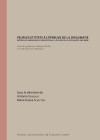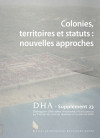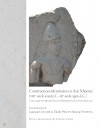
- Summary
-
This book intends to adopt the point of view of the Greek communities in front of the Roman conquest in order to re-examine their role in the formation of the imperium Romanum and the way in which they accommodated themselves locally to the new global order. We intend to vary the angles of approach and the scales of analysis, like the attitude of the cities towards a Roman magistrate, the strategy of private persons with an imperator, the social position of the Italians settled in Greek cities... How did Rome’s brutal interference in Greek affairs gradually was changed into a more or less active participation of Greek communities and individuals to an empire in progressive construction?
- Contents
-
Avant-propos
Christel Müller
Conférence inaugurale
† Jean-Louis Ferrary
Introduction
Clément Bady, Olga Boubounelle, Alexandre Vlamos
Partie I
Choix et stratégies des communautés grecques face au nouvel Empire/Part I: Choices and Strategies of Greek Communities Facing the New EmpireThe Battle of Pydna and the Monetary History of the Achaean League
David Weidgennant
The Cities of Western Asia Minor and Rome: Local Agency in the Construction of Empire (133-44 BCE)
Bradley Jordan
Entre César et Pompée. Les Grecs face à l’imperium Romanum en temps de guerre civile (49-48 avant J.-C.)
François Porte
La « liberté des Argiens » (Tite-Live, XXXIV, 41) sous l’imperium Romanum
Clémence Weber-Pallez
Les Grecs et l’empereur romain : Néron et « faux Néron » en Achaïe et en Asie
Mathias Nicolleau
Partie II
Recompositions sociales et trajectoires individuelles dans l’Empire en construction/Part II: Social Reconfiguration and Individual Trajectories during the Reconstruction of the EmpireD’une élite à une autre ? L’impact de la conquête romaine et de la provincialisation sur les hiérarchies sociales en Macédoine
Olga Boubounelle
Les communautés de Romains sont-elles solubles dans la cité ? Cités égéennes, Rhômaioi et l’imperium Romanum aux iie et ier siècles avant notre ère
Alexandre Vlamos
Roman Power and the Memorial Turn in Civic Honourability in Western Asia Minor, ca 85 BCE-14 CE
Marcus Chin
L’entourage hellénophone d’Antoine et Octavien/Auguste. Transferts d’allégeance et stratégies de résilience
Clément Bady
Adhésion et contre-pouvoir rhétoriques chez Dion Chrysostome. Le sophiste et l’Empire dans le troisième discours Sur la royauté
Vincent Cinotti
Bibliographie
Résumés
- Author (s)
-
Clément BADY (edit. director)Clément Bady, Doctor in ancient history, fellow of the French School in Rome, ArScAn.Olga BOUBOUNELLE (edit. director)Olga Boudounelle, PhD candidate in ancient history (Université Paris Nanterre), ArScAn.Alexandre VLAMOS (edit. coord.)Alexandre Vlamos, PhD candidate in ancient history (Université Paris Nanterre), ArScAn.Christel MÜLLER (with the coll. of)Paul ERNST (with the coll. of)Gabrielle FRIJA (with the coll. of)Anna HELLER (with the coll. of)
- Readership
-
Researchers in Greek and Roman history interested in the establishment of the imperium Romanum in Greece, the evolution of Greek cities in the late Hellenistic and early Imperial periods in the Aegean area, and the contacts between Greeks and Romans during this period.
- downloadable items
- Reviews and press reviews
- Online
- Support (s)
-
Publié avec le concours de l’Institut des Sciences et Techniques de l’Antiquité (UFC – ISTA UR 4011), de l’École doctorale Espaces, Temps, Cultures de l’université Paris Nanterre, et de l’UMR ArScAn – équipe ESPRI.












